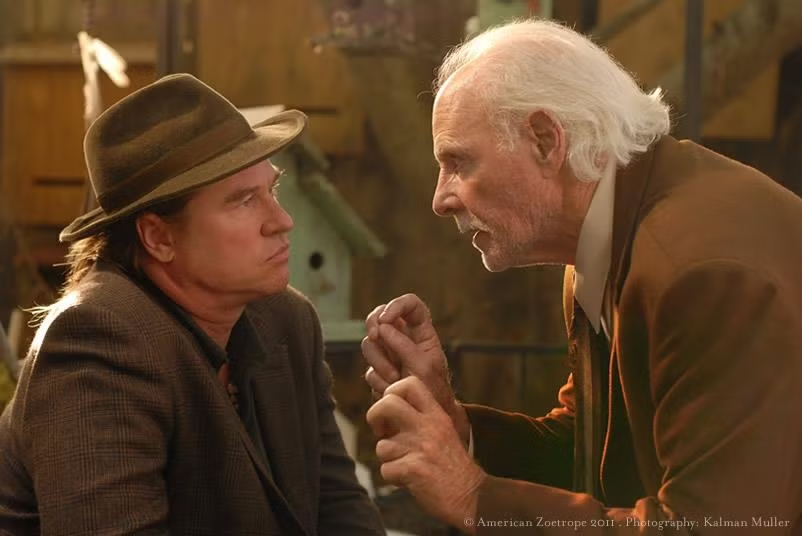“Crap? I like crap. I love crap. I need crap”
Mac Turner-Transylvania 6-5000
Francis Ford Coppola’s Twixt is an absolute mess of a film. I’m not the biggest fan of Coppola’s work. I know this is unpopular, but I’ve always found that the performances buoy his movies, and his direction did nothing if not hinder them. This should’ve been a dark and introspective take on grief and loss, but instead, it’s a disjointed, poorly crafted experiment that never finds its footing.

The film follows a washed-up horror writer, played by a thoroughly uninterested Val Kilmer, who stumbles into a small town with a mysterious past. Instead, what should be a gripping exploration of the human psyche and personal tragedy becomes an incoherent collection of half-baked ideas, awkward dream sequences, and confusing narrative shifts. Kilmer’s performance feels phoned in, contributing to the film’s overall lack of engagement.
And then there’s Elle Fanning, who is wildly miscast as a ghostly figure haunting Kilmer’s character. Her usual charm and talent are wasted here, as she’s given little to work with beyond ethereal stares and cryptic lines that ultimately go nowhere. The entire film feels like it’s floating in the ether, unable to ground itself in any kind of cohesive or meaningful direction. One of the film’s few saving graces is Bruce Dern, whose portrayal of Sheriff Bobby LaGrange injects some much-needed energy and eccentricity into the otherwise dull proceedings. Dern seems to be the only actor having fun, and his performance stands out as a beacon of entertainment in a film otherwise devoid.

The most baffling aspect of Twixt is Coppola’s attempt at making the film a metaphor for grief. While there are moments where the allegory for loss, particularly the death of a loved one, starts to peek through, it’s so buried beneath layers of confusion and self-indulgent filmmaking that it’s hard to take seriously. The intended emotional weight is lost in the clumsy execution, making what could have been a powerful theme feel like an afterthought.

Twixt suffers not only from its incoherent plot but also from painfully bad cinematography, which undermines any potential the film might have had. Instead of enhancing the eerie, gothic atmosphere Coppola aims for, the visuals feel disjointed and cheap. The inconsistent lighting and awkward camera angles create a sense of amateurishness. Particularly in the dream sequences, what should have been a stylistic flourish instead comes off as a poorly conceived gimmick. Scenes set in the bizarre dream world rely on murky, washed-out colors that are more headache-inducing than atmospheric, leaving the audience detached and distracted.

Twixt is a disappointment from start to finish. Despite Dern’s efforts, the film is a slog that never justifies its existence. Coppola’s direction feels less than incompetent, and the script isn’t more than an outline of an idea. Kilmer is merely going through the motions, but the lackluster cinematography seals Twixt’s fate as a film that doesn’t come close to living up to its potential
Rating: 2/10




